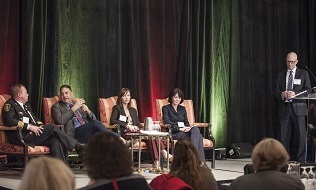

Post-traumatic stress syndrome can affect anyone, whether a first responder who faces traumatic events on the job or someone who experiences an emotional shock such as a car crash, sudden death, divorce or a crime incident. A panel of experts at the recent Mental Health Summit in Vancouver shared suggestions for how employers can better support employees with PTSD.
Rob Clarke, an 18-year veteran of the RCMP and a former member of Parliament, opened the discussion by describing his bout with PTSD. Ten years ago, he was in charge of an RCMP detachment when three of his officers were shot, two of whom subsequently died. Two more incidents compounded Clarke’s trauma. As a member of Parliament, he was present during the 2014 terrorist attack on Parliament. Later that year, he received death threats when he submitted a private member’s bill to the House of Commons.
Read: Hundreds of veterans likely affected by change to medical pot allotment
Clarke suffered a range of symptoms: not sleeping or eating, out-of-body experiences, numbness and forgetfulness. “If not treated or properly diagnosed, PTSD can lead to a chemical imbalance in the brain,” he said. “My advice when someone goes through a traumatic experience is to pull them aside and ask how to help. It took years before I could come forward and talk about it. Early intervention is key because it is very easy for someone to get lost in the system.”
Stacey Ferland, national practice lead for trauma services at Homewood Health, noted that many people with PTSD don’t come forward because of stigma and lack of support. “But today, we’re seeing a cultural shift as more higher-ranking soldiers and RCMP acknowledge they are struggling.”
In the past, firefighters at the Victoria fire department would often deal with trauma experienced on the job by spending time in the pub. Recognizing the increased potential for PTSD among employees, Chief Paul Bruce recently implemented additional training on mental resilience to supplement peer-led critical incident stress debriefing and peer support tools as a better way to help people cope. “We were compelled to introduce a more inclusive atmosphere to the whole department so we could identify if a member may not be doing well,” he said. “Not talking about it or telling people to man up is not helpful.”
Read: New mental-health program for paramedics ‘long overdue’
At Coast Mountain Bus Co., employees started a volunteer program in 1992 to help people manage feelings after a traumatic incident. The program has since expanded with support from the company. Debbie JoustraPel, manager of occupational health at Coast Mountain Bus, stressed the importance of working with the employee and family assistance program to get the message out to employees about the type of help available. The company also developed a flexible return-to-work program that allows for gradual exposure until people are comfortable enough to be back on the job.
Bruce also spoke in more detail during a separate session at the conference on the fire department’s mental resilience efforts. “Since more than half of people affected with mental-health issues or problems are unwilling to disclose, we wanted to impose on everyone the importance of their role in sharing and, as an employee of the fire service, to let someone know if they are struggling,” he told the conference.
The department’s efforts focused on training on mental fitness and resilience to help employees deal with incidents, reduce stress, improve communications and boost leadership skills. The efforts quickly began to pay off, with increased trust and camaraderie and significant savings savings in sick time and workers’ compensation claims.
Read: Ontario passes legislation to support first responders with PTSD
